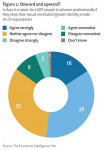Policy gaps and weak enforcement undermine India’s anti-tobacco campaign
The strategies adopted by India in its anti-tobacco movement have been tried and tested in the developed world. In India, however, some are easier to implement than others. For instance, measures like a comprehensive, nationwide ban on smoking in public places and a ban on direct tobacco advertising are showing some encouraging results. Taxation policy, however, has not yielded the desired results because it has not been evenly applied across different tobacco products, leaving users with cheaper alternatives. Other policy areas that need more concerted efforts by the government include public awareness and access to tobacco-cessation methods.
“The key to the effectiveness of other countries’ anti-tobacco crusades is their holistic approach, covering taxation, public awareness, access to cessation methods and, most importantly, enforcement” says Manoj Vohra, a senior editor and research director with the Economist Intelligence Unit. “While India’s government has introduced several anti-tobacco measures, they have been mostly piecemeal and ineffective due to weak and lopsided enforcement.”
The study identifies some of the key areas where India’s anti-tobacco policy needs refinement, including:
· Public awareness: Since 2007, the government has deferred the decision to introduce mandatory pictorial health warnings on tobacco packaging six times. Activists allege that a strong political lobby, protecting the interests of the tobacco industry, has prevented the necessary legislation from being introduced. Meanwhile, attempts to ban smoking in public places have had mixed results. Though the momentum towards implementing such a ban has gathered force, sustained enforcement and public awareness hold the key.
· Tobacco taxation: Taxing tobacco heavily has been effective in reducing tobacco consumption in several countries, such as South Africa and Spain. In India, however, existing taxation policy has been ineffective. Although cigarettes are taxed heavily, there is almost no tax on bidis (a leaf-rolled local mini cigarette) and chewing tobacco, meaning cigarette smokers have been able to switch to cheaper methods of tobacco consumption with little penalty.
· Indirect advertising and promotion of tobacco products: India has a comprehensive law to prohibit tobacco advertising, sales and promotion, although it does not apply to “point of sale” advertising. Regulation and enforcement of the law, however, is complex, and monitoring weak. Most tobacco companies blatantly exploit surrogate advertising and promotions. For example, they are still allowed to promote fashion shows, awards functions like bravery awards for women and so on.
· Access to structured tobacco-cessation methods: India has only about 20 tobacco-cessation centres in the country—and the focus is on offering behavioural counselling, with limited medical treatment capability. While the government has ambitious plans to establish a cessation centre in each district of the country by 2012, it is going to be a tall order, given India’s competing health priorities and the lack of skilled human resources at the district level. Beyond government efforts, industry associations have been contemplating organising counselling and cessation services for industry clusters. But very few have actually done anything about it. Experts blame the inadequacy of counselling and cessation infrastructure in the country for this deficiency. A few companies in India, however, have gone ahead and started providing counselling and cessation services to employees.
The war against tobacco: A progress report from the Indian front is available free of charge at: www.eiu.com/sponsor/pfizer/thewaragainsttobacco/
About the Economist Intelligence Unit
The Economist Intelligence Unit is the business information arm of The Economist Group, publisher of The Economist. Through our global network of more than 650 analysts and contributors, we continuously assess and forecast political, economic and business conditions in more than 200 countries. As the world's leading provider of country intelligence, we help executives make better business decisions by providing timely, reliable and impartial analysis on worldwide market trends and business strategies. For more information, please visit www.eiu.com
웹사이트: http://www.eiu.com
연락처
Joanne McKenna
Press Liaison
Economist Intelligence Unit
26 Red Lion Square
London
WC1R 4HQ
UK
Direct: +44 (0) 20 7576 8188
Sales: +44 (0) 20 7576 8181
Switchboard: +44 (0) 20 7576 8000
email: 이메일 보내기
이 보도자료는 Economist Intelligence Unit가(이) 작성해 뉴스와이어 서비스를 통해 배포한 뉴스입니다. 뉴스와이어는 편집 가이드라인을 준수합니다.




